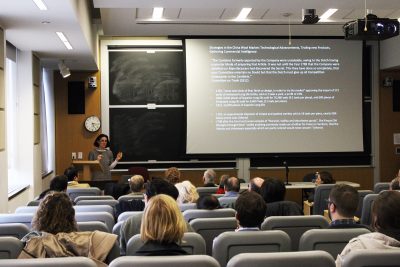
About 50 Boston University students and professors gathered for a panel about China and Great Britain’s 19th century Opium War and its current significance on Friday afternoon in the College of Arts and Sciences. BU’s Pardee School of Global Studies Center for the Study of Asia and the International History Institute co-sponsored the panel as part of BUCSA’s event series with the theme, “Asia in the World: Conflict and Engagement.”
BU history professors Eugenio Menegon and Arianne Chernock chaired the panel. Menegon teaches a class on Maritime Asia and Chernock is an expert on modern British and European history with a focus on politics and the monarchy. They thought this panel would be able to bring the content of their two classes together and inform students of the rich history between China and the West relating to the 19th century Opium War, Menegon said.
During the panel, Nanyang Technical University history professor Chen Song-Chuan and Rhode Island School of Design history professor Rachel Silberstein talked about the commercial reasons behind the Opium War, comparing and contrasting Eastern and Western perspectives.
Chen gave a brief summary of his research for his new book about Britain and China in the Opium War. He asserted that in addition to opium being the most widely-known cause of the war, small groups of elite merchants advocated for war as a way to make a profit.
Silberstein said she examined the conflict from a commercial perspective, primarily with textiles. She said a major incentive for the British to enter the war with China was to unlock its vast markets for commercial sale and trade.
Chen also connected the 19th century armed conflict with those of modern day warfare.
“The British government decided to go to war against the public and this is paralleled in 2003 [with the Iraq War],” he said during the panel. “It is no different than today, as people started meeting in halls and parks and were talking about how the war is wrong. The newspapers were also publishing that the war was wrong.”
Menegon said he hoped audience members would be able to draw these historical connections for themselves.
“What I hope for people to learn from these lessons is to be critical so when events, such as the bombing of Syria today, happen, we should be opening our eyes and consider, what are the reasons the government is giving us, are there other reasons out there?” he said before the panel.
Menegon also said as members of a global university, BU students should try to be historically conscious, particularly of Asia, where a large portion of the international population is from.
“The student body here should become more and more aware of the importance of [the Asian] region,” he said. “I think, to be a global school and to have students from the United States and the rest of the world to be globally aware means they have to be aware about Asia”
Students in attendance said they thought the topic of discussion was timely and the discourse was thought-provoking.
Zhe Zhao, a CAS junior, said he thought the topic was relevant and appreciated what the different speakers had to say.
“For me, this is also talking about a very important war going on in Chinese history, which makes China from an ancient civilization and turn into a modern one,” he said. “It is meaningful to hear from perspectives about Asian issues.”
Victoria Aregullin, a CAS senior in Pardee, said having conversations about other cultures can help bridge gaps not only on campus but worldwide.
“[The topic] is very important,” she said. “I think understanding different cultures can help not only in the business environment but in conflict resolution. What we may perceive as something that may be threatening, if we understand that culture, [actually] gives us a completely perspective, and changes the way we approach a situation.”
Agnes Burt, a fourth-year Ph.D. student in CAS, said she enjoyed learning about the complementary points of view.
“I like the two very different perspectives: one about material culture, one about drugs and the making of war,” she said. “It shows the overlapping interests between those two perspectives.”
Burt also said she appreciated the opportunity to learn some history about her fellow students of Chinese descent.
“I think it’s incredibly important with so much of the [BU] population from China to learn about the history of the place where your colleagues are coming from,” she said.















Great job Nathan!